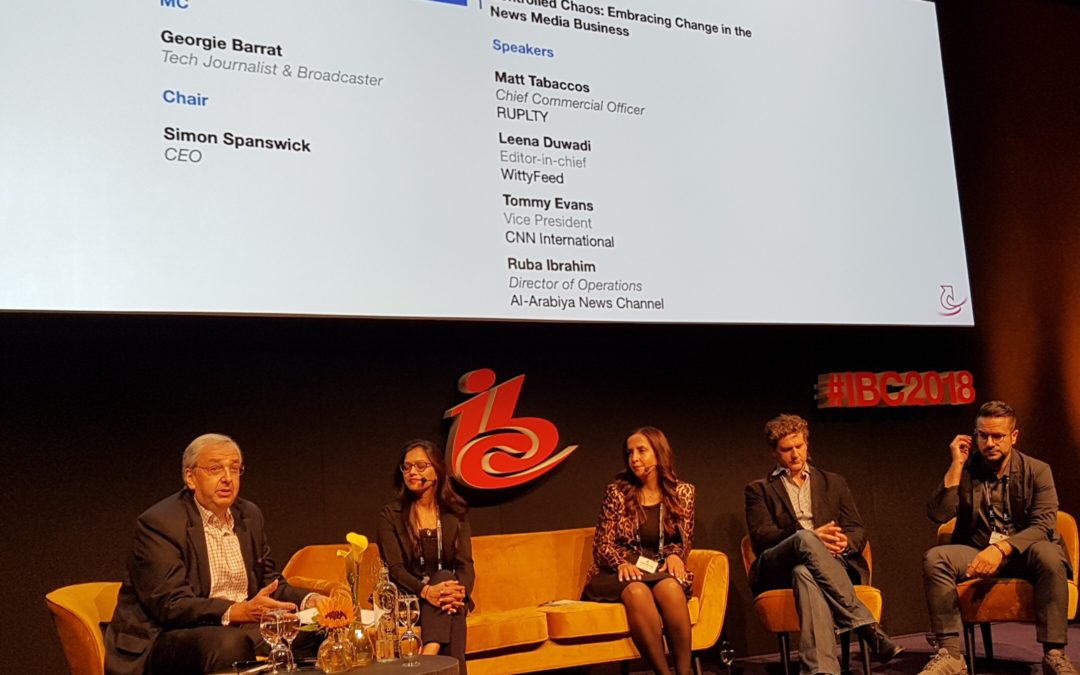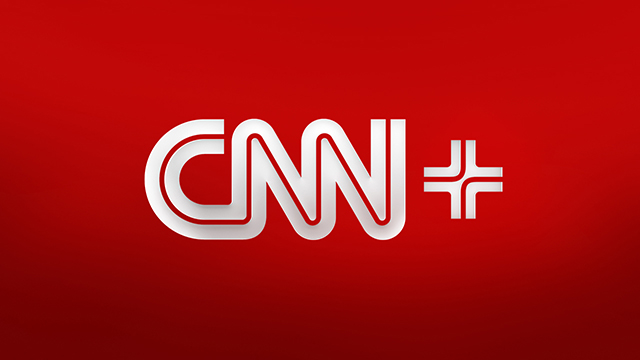
17 September 2018
At the International Broadcasting Convention (IBC) held every year in Amsterdam, news was the focus of some of the conferences at a time when news media organisations, broadcasters in particular, face a number of challenges from new players, social media platforms and questions about their perceived lack of credibility and balance in some countries.
AIB leads debate with industry senior representatives
The AIB was at the centre of one of these conferences with its CEO, Simon Spanswick, chairing a session, entitled “Controlled chaos: Embracing change in the news media business”.
In this meeting, senior representatives from well-established broadcast organisations as well as from relatively new players, discussed the issues they faced and how they worked to best deal with these.
Panellists explained how their respective organisations were embracing media changes, both as regards the use of technological innovations, and the need to meet audience expectations.
The panellists, Leena Duwadi, Editor in Chief, WittyFeed, Ruba Ibrahim, Director of Operations, Al-Arabiya News Channel, Tommy Evans, VP CNN International and Matt Tabaccos, Chief Commercial Officer, of the Ruptly video news agency, described how their organisations addressed the various issues.
Shifting content, audience expectations
WittyFeed understood that the whole concept of content on the Internet was shifting, and WittyFeed idea from its creation in 2014, was to offer “content for the Millenials, produced by Millenials,” Duwadi said. From its beginning, WittyFeed proposed “vivid formats, ranging from stories to videos which differentiate it from other large Indian media companies that have hundreds of millions of users, listeners and viewers.”
Reaching a diverse Arab world audience
Ruba Ibrahim, director of operations of the Dubai-based Saudi-owned 24/7 free-to-air Al-Arabiya pan Arab News Channel launched in 2003, described the main channel and its younger “sister”, Al-Hadath, launched in 2012, which offers more in-depth, extensive coverage of political news.
Al-Arabiya has an English website also and is present and very active on digital platforms and social media.
Ibrahim explained how different content was tailored in content and length to meet the diverse requirements of the multiple platforms, showing examples of reports for online and mobile devices.
Spanswick asked how the channels were tackling the issue of addressing audiences across the entire Arab world. Ibrahim said that Al-Arabiya was primarily targeting audiences in the Gulf area, where audiences share the same language, issues and challenges, covering news, business and sports, and offering documentaries. Following the “Arab Spring”, Al-Arabiya’s extensive, but still limited resources didn’t allow it to cover all the news across the entire Arab world, so Al-Hadath was tasked with covering more specifically news and issues about Yemen, Iraq, the Levant and North Africa.
CNN: Golden age of news, healthy mix of news needed
Tommy Evans, VP of CNN International and CNN London bureau chief, said that “it was the golden age of news. US President Trump makes a lot of news and news is good for CNN and other news organisations.”
The key to success, he added, was “good content”, but he also advised for a varied and balanced mix between hard and soft news. “You can’t expect the audience to be brutalised by bad news constantly. You have to have a healthy mix of stories,” Evans warned.
CNN was established as a cable news network in 1980, but gained international recognition when it was the only channel broadcasting from inside Iraq from the beginning of the first Gulf War in January 1991. CNN launched its website, CNN.com in August 1995. It is now one of the most popular news websites in the world.
CNN has a wide offer of different programmes and online services that cover travel, style (arts, design fashion, architecture), health (food, health, wellness, fitness, etc.), features (freedom project, Impact your world, Inside Africa, climate / environment issues, etc) and even a virtual reality (VR) service, CNNVR.
Ruptly introduced flexible model, imaginative approach
Matt Tabaccos, Chief Commercial Officer, of the Berlin-based Ruptly video news agency, created in 2013 and owned by Russia’s RT television network, detailed the services offered by Ruptly.
These include an offer of real-time and archive visual news content to all media, from broadcast networks large and small to online content providers, including broadcast, digital and mobile platforms.
Ruptly value proposition, Tabaccos said, was “to try to be first, to pioneer new ways of telling stories.” Ruptly was one of the first news organisations to fly drones over war zones, which was the kind of content that resonated over the different platforms, online and broadcast, he said.
“Technology has been one of our main selling points,” Tabaccos added pointing out that Ruptly now gets some 500 million views across platforms every month. The idea is to service broadcasting organisations, start-ups and ordinary users, through flexible models, he said.
Tabaccos announced that Ruptly had just expanded its offer with Ruptly Pass, a “disrupting” subscription-based model “for individuals and growing media entities”, which gives users unlimited access to video and live events on the service for €12.50 a month.
The “Controlled chaos” conference provided a comprehensive overview of the diverse and imaginative approaches adopted by just four media organisations with different audiences to address some of the many challenges faced by the whole broadcast news media industry today.

7 September 2018
IBC, the International Broadcasting Convention, held each September in Amsterdam, opens its doors on 13 September for its series of renowned conferences, with the exhibition opening the following day.
More than 57,000 visitors are expected to come to experience products and services offered by more than 1,700 exhibitors. IBC offers also a unique opportunity for broadcast professionals to network.
Many AIB members, among them broadcasters, content providers or leading technology companies will be present at IBC.
More than 400 speakers including business leaders, global game-changers and disruptors in the media, entertainment and technology industries will address some 1,700 delegates attending the conferences.
As in previous years, and in view of growing concern about so-called fake news and misinformation, news production and delivery will be the focus of several sessions.
One of these, Controlled chaos: Embracing change in the news media business, is dedicated to change in the news media business. It will be chaired by AIB CEO Simon Spanswick. Panellists will include the VP of CNN International, the director of operations of Al-Arabiya News Channel, the Chief Commercial Officer of Berlin-based Ruptly news agency and the editor-in-chief of WittyFeed, one of the fastest growing online content platforms in India. They will explain how they have embraced a constantly changing news media market, from content creation that appeals across diverse audiences, to platform and technical innovation, to scalable models and monetisation.
Reflecting technological advances, and as forecast last year, topics discussed in the conferences will include, among many others, the impact of AI, of voice-activated devices and services, of blockchain.
Changing the “face of content” to reach a younger generation on a multitude of devices, will also be debated.
No less important will be the impact of these technological advances on the production and delivery of services on new platforms for connected audiences, and the fast-growing of fairly recent services, such as e-sports and online gaming.
As usual, very advanced technologies, such as 8K, will be demonstrated by leading set manufacturers and broadcasters; the challenges they represent in terms of content production and delivery will be addressed in technical papers and presentations.
The AIB will be present at IBC and report during, and after, the convention on the conferences as well as on a wide range of issues and new products and services unveiled this year.

 Reporters including Steve Herman – a long time correspondent for Voice of America (pictured) who has covered the White House extensively – and others from CNN, the New York Times and Washington Post have all been locked out of their accounts.
Reporters including Steve Herman – a long time correspondent for Voice of America (pictured) who has covered the White House extensively – and others from CNN, the New York Times and Washington Post have all been locked out of their accounts. 



